Toren is a difficult game to classify. It sits somewhere between narratively-driven art titles like Dear Esther and Gone Home, and the more simplistic side of action-adventure titles like Ico and Shadow of the Colussus. Its narrative centers around a girl born into a barren world and her metaphorical journey of self-realization, and is influenced heavily by a marriage of folkloric tales.
Toren is the first title from indie developer Swordtales, and was one of the first titles developed with financial assistance from the Brazilian government. It’s already something of an industry darling, having been nominated for a number of indie gaming awards, among them an Honorable Mention for excellence in Visual Arts at IGF 2012.
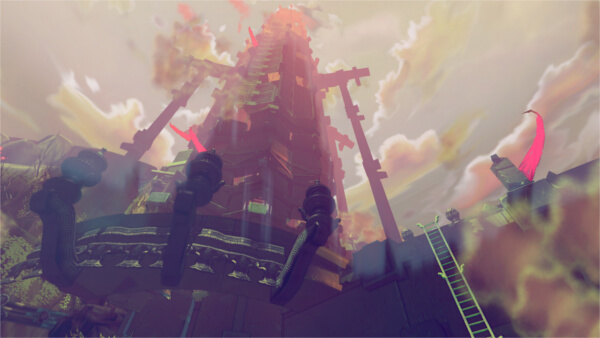
It’s a parallel that’s been made before, and it’s a difficult one to escape – so many of the visual choices and the design elements recall Ico, and to a lesser degree Shadow of the Colossus. Fans of the fictional world shared by both of those titles will feel right at home with Toren. The simplicity of the game-play, the animation, and the art style are all reminiscent of an earlier, simpler time in game development – for good and ill.
The marriage of folklore to the narrative and the art style are Toren’s greatest strength, and for some people, that might be enough. It’s certainly an interesting narrative, with some excellent art behind it, and it’s unique enough to be a refreshing experience.
[youtube]https://youtu.be/7xZeSNH72Cw[/youtube]
There are situations wherein I am reluctant to bend the full weight of my criticism on a title; I believe that early access titles, indie titles, and games with complicated development histories deserve the benefit of the doubt. This is, on a lot of levels, a beautiful game, and it’s certainly an important game. Indie developers should be supported, and I think it’s wonderful this title was made with the support of a governmental grant, but the simple and unfortunate truth is that I’m not sure it’s much of a game. It wasn’t exactly a sodden slog through a swamp, it wasn’t a miserable experience, but I’m just not sure that I could describe it as enjoyable. I appreciated the narrative, and the ties to folklore, and the use of poetry. I appreciated the art. And it’s true that there are a number of examples of titles that are excellent, and not necessarily enjoyable. I specifically introduced Dear Esther and Gone Home because they exist as a function of the narrative, and only to communicate that narrative. Both of these have less in the way of mechanics that Toren, but at their core all three share a dedicated intent to engage the audience primarily by narrative rather than mechanics. I also mention these specifically because they excel on that front, they are the consummate examples of wholly narratively driven interactive entertainment, and as such they are the yardstick by which the genre should be measured.
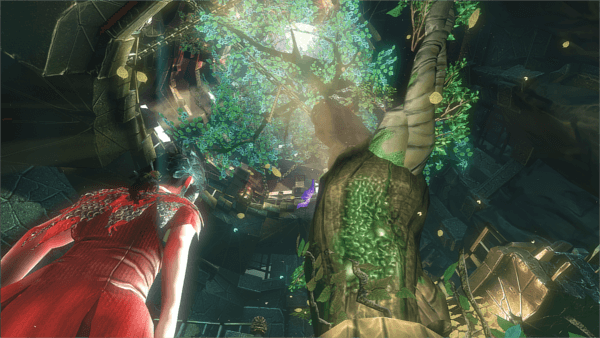
The unfortunate truth is that Toren, for all of the artistry behind it, is not all good. The animation is awkwardly disjointed, and the visuals are not as well-realized as the art design deserves. There’s a lot of great artwork behind Toren, excellent to the point of brilliant, that simply isn’t translated, and that’s a real tragedy. I want to say it’s a beautiful game, but I just can’t. The texture work is all over the place, some of it quite well done and others – massive textures in obvious places – are poorly handled and muddy. Yet the quality of the art design behind the title is simply good enough that even spotty execution still results in a genuinely pretty package, as long as you don’t look too closely. The overall visual experience is, somehow, more than the sum total of its parts. It gives the impression of being a beautiful game, despite some glaringly obvious issues.
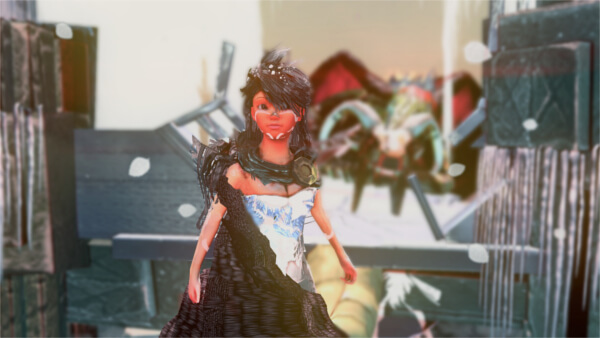
None of the game-play mechanics exist on a level above rudimentary, and they consist completely of simplistic and somewhat unimaginative puzzles, simplistic, and often imprecise platforming, and finally simplistic, and annoyingly awkward combat. There are a number of strange mechanics that aren’t sufficiently explained or established: when you damage certain enemies, the sword disappears and teleports – it’s not made clear whether it was flung from your grasp or if there’s another explanation. The camera seems to indicate the proper direction of exploration about half of the time, but this is frustratingly unreliable. The platforming is plagued by spotty collision, and unreliable character momentum.
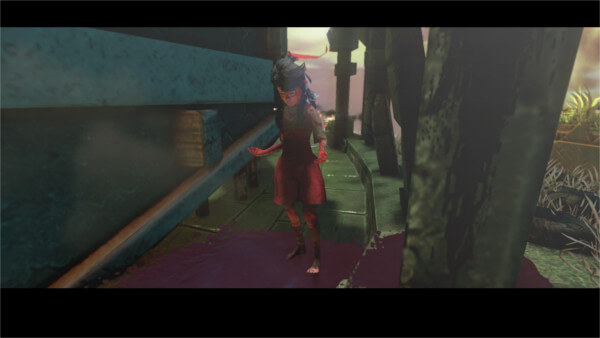
The ‘camera’ button is bewildering and useless in about 90% of situations, the only exception being a reflection puzzle that was so poorly explained that I had all but completed it by the time the usefulness of the camera mechanic became apparent. The title is also quite poorly optimized for mouse-and-keyboard, but to be fair, the title does gives clear warning of that fact.
Significantly less clear is the logic behind a lot of the game-play mechanics – it simply doesn’t hold up to any sort of logical analysis. A great deal of Toren’s platforming is based around wind puzzles. This is nothing new, allowing for timing your movements and jumps. The wind rises and dies specifically for the puzzles, just in time to make the platforming difficult with little or no in-game justification – these harsh winds are sometimes caused by an antagonist, but sometimes they’re simply present without justification, and the fact that they appear and disappear specifically as obstacles is somewhat irritating.
Similarly, there’s a sequence roughly half-way through the title in which you are in danger of freezing unless you maintain a heat-source on your person or hunker down near one. Given Toren’s almost exclusively narrative appeal, I will keep the details to a minimum but the objective of the title is to scale a tower to its peak. The world of Toren is constantly blasted by a harsh sun, and the sun itself is located at the top of the titlar Toren (Dutch for Tower). In the midst of this upward journey – closer and closer to the sun – you are blasted by arctic winds.
This weather hazard then disappears as quickly as it was conjured, without any explanation. Given the sheer number of time-shifts and dream-sequences that take place in Toren I will allow for the possibility that the justification for this sequence exists but like so much of the title, there is a fat, thick vague streak in the middle of the design philosophy. Why? It just is. It’s just that way. There’s a lack of internal logic across the board in Toren that simply difficult to ignore. The core principles of game-play mechanics dictate that those mechanics should be fun, should present a challenge that’s satisfying to overcome, and should make at least a limited amount of sense. While there’s a degree of splitting hairs in analyzing the puzzles to this degree, I’m struggling to find the logic in the third because so much of the title fails on the first two points.
I think the core issue is that the title forces a mechanical layer over a narrative, instead of trusting that narrative to do the work – this is a shame, because the narrative would have. The introduction of shallow mechanics over the narrative serves only to irritate via the mediocre execution of those mechanics and that serves only weaken the impact and the beauty of the world.
One of the more interesting mechanics in the title requires the player to trace symbols on the ground by pouring salt over them, and this is used several times to acceptable effect. It is also the best example of poor execution in the title. I would say that the mechanic was in-and-of-itself fun, or challenging enough to provide a satisfying sense of accomplishment upon completion, but who on earth thought that it would be an acceptable choice to require the player to trace a figure with salt in pitch-dark with the only illumination provided by lighting that flashes roughly every 15 seconds? The only proper course of action is to flail about blindly in the dark, or wait fifteen seconds to move one iota in the right direction. Worse still, this is inflicted upon the audience several times in a row.
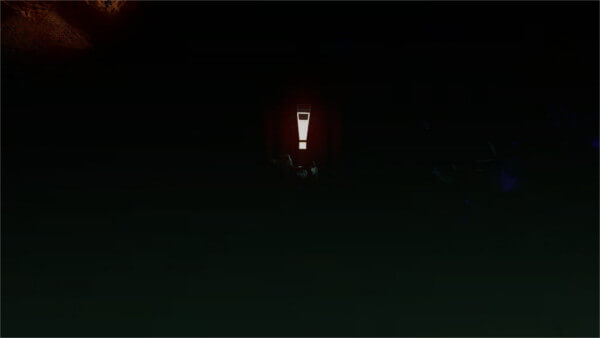
In a longer title that perhaps wouldn’t have been such a point of pain, but Toren rounds out at just over three hours of game-play – and that’s a review play-through. I suspect strongly if I had been playing the title as a consumer, I would have completed it in half the time – if at all. At $9.99 three hours isn’t quite a deal-breaker, but I wouldn’t describe it as a good deal. You can do everything you need to do in Toren in two play-throughs, and you can easily do both of those in one evening.
Developer Swordtales has locked on to the phrase “Brings Poetry to Life,” for Toren, and to a degree this is true. There’s a great deal of art behind Toren, visual and verbal, and that is its greatest strength. Whether you will enjoy Toren will hinge completely on whether you can forgive the mediocre execution of its promise.
Toren released on May 12th of 2015 on PC via Steam and PlayStation 4.